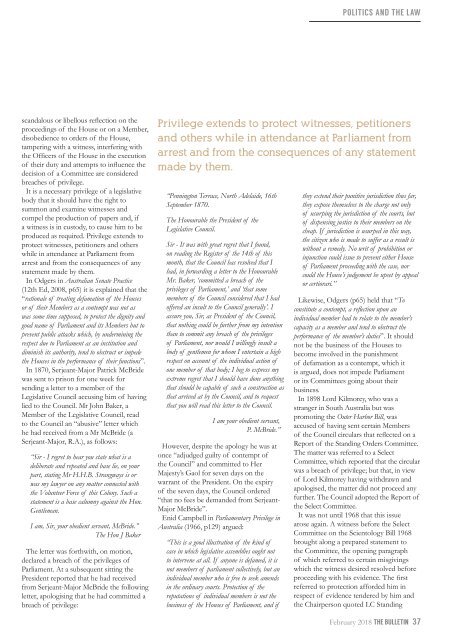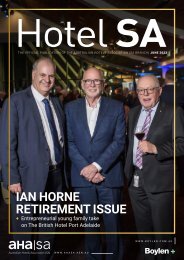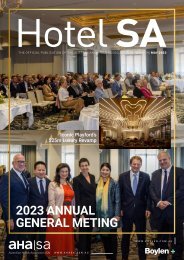LSB February 2018_Web_LSSA
You also want an ePaper? Increase the reach of your titles
YUMPU automatically turns print PDFs into web optimized ePapers that Google loves.
POLITICS AND THE LAW<br />
scandalous or libellous reflection on the<br />
proceedings of the House or on a Member,<br />
disobedience to orders of the House,<br />
tampering with a witness, interfering with<br />
the Officers of the House in the execution<br />
of their duty and attempts to influence the<br />
decision of a Committee are considered<br />
breaches of privilege.<br />
It is a necessary privilege of a legislative<br />
body that it should have the right to<br />
summon and examine witnesses and<br />
compel the production of papers and, if<br />
a witness is in custody, to cause him to be<br />
produced as required. Privilege extends to<br />
protect witnesses, petitioners and others<br />
while in attendance at Parliament from<br />
arrest and from the consequences of any<br />
statement made by them.<br />
In Odgers in Australian Senate Practice<br />
(12th Ed, 2008, p65) it is explained that the<br />
“rationale of treating defamation of the Houses<br />
or of their Members as a contempt was not as<br />
was some time supposed, to protect the dignity and<br />
good name of Parliament and its Members but to<br />
prevent public attacks which, by undermining the<br />
respect due to Parliament as an institution and<br />
diminish its authority, tend to obstruct or impede<br />
the Houses in the performance of their functions”.<br />
In 1870, Serjeant-Major Patrick McBride<br />
was sent to prison for one week for<br />
sending a letter to a member of the<br />
Legislative Council accusing him of having<br />
lied to the Council. Mr John Baker, a<br />
Member of the Legislative Council, read<br />
to the Council an “abusive” letter which<br />
he had received from a Mr McBride (a<br />
Serjeant-Major, R.A.), as follows:<br />
“Sir - I regret to hear you state what is a<br />
deliberate and repeated and base lie, on your<br />
part, stating Mr H.H.B. Strangways is or<br />
was my lawyer on any matter connected with<br />
the Volunteer Force of this Colony. Such a<br />
statement is a base calumny against the Hon.<br />
Gentleman.<br />
I am, Sir, your obedient servant, McBride.”<br />
The Hon J Baker<br />
The letter was forthwith, on motion,<br />
declared a breach of the privileges of<br />
Parliament. At a subsequent sitting the<br />
President reported that he had received<br />
from Serjeant-Major McBride the following<br />
letter, apologising that he had committed a<br />
breach of privilege:<br />
Privilege extends to protect witnesses, petitioners<br />
and others while in attendance at Parliament from<br />
arrest and from the consequences of any statement<br />
made by them.<br />
“Pennington Terrace, North Adelaide, 16th<br />
September 1870.<br />
The Honourable the President of the<br />
Legislative Council.<br />
Sir - It was with great regret that I found,<br />
on reading the Register of the 14th of this<br />
month, that the Council has resolved that I<br />
had, in forwarding a letter to the Honourable<br />
Mr. Baker, ‘committed a breach of the<br />
privileges of Parliament,’ and ‘that some<br />
members of the Council considered that I had<br />
offered an insult to the Council generally’. I<br />
assure you, Sir, as President of the Council,<br />
that nothing could be further from my intention<br />
than to commit any breach of the privileges<br />
of Parliament, nor would I willingly insult a<br />
body of gentlemen for whom I entertain a high<br />
respect on account of the individual action of<br />
one member of that body; I beg to express my<br />
extreme regret that I should have done anything<br />
that should be capable of such a construction as<br />
that arrived at by the Council, and to request<br />
that you will read this letter to the Council.<br />
I am your obedient servant,<br />
P. McBride.”<br />
However, despite the apology he was at<br />
once “adjudged guilty of contempt of<br />
the Council” and committed to Her<br />
Majesty’s Gaol for seven days on the<br />
warrant of the President. On the expiry<br />
of the seven days, the Council ordered<br />
“that no fees be demanded from Serjeant-<br />
Major McBride”.<br />
Enid Campbell in Parliamentary Privilege in<br />
Australia (1966, p129) argued:<br />
“This is a good illustration of the kind of<br />
case in which legislative assemblies ought not<br />
to intervene at all. If anyone is defamed, it is<br />
not members of parliament collectively, but an<br />
individual member who is free to seek amends<br />
in the ordinary courts. Protection of the<br />
reputations of individual members is not the<br />
business of the Houses of Parliament, and if<br />
they extend their punitive jurisdiction thus far,<br />
they expose themselves to the charge not only<br />
of usurping the jurisdiction of the courts, but<br />
of dispensing justice to their members on the<br />
cheap. If jurisdiction is usurped in this way,<br />
the citizen who is made to suffer as a result is<br />
without a remedy. No writ of prohibition or<br />
injunction could issue to prevent either House<br />
of Parliament proceeding with the case, nor<br />
could the House’s judgement be upset by appeal<br />
or certiorari.”<br />
Likewise, Odgers (p65) held that “To<br />
constitute a contempt, a reflection upon an<br />
individual member had to relate to the member’s<br />
capacity as a member and tend to obstruct the<br />
performance of the member’s duties”. It should<br />
not be the business of the Houses to<br />
become involved in the punishment<br />
of defamation as a contempt, which it<br />
is argued, does not impede Parliament<br />
or its Committees going about their<br />
business.<br />
In 1898 Lord Kilmorey, who was a<br />
stranger in South Australia but was<br />
promoting the Outer Harbor Bill, was<br />
accused of having sent certain Members<br />
of the Council circulars that reflected on a<br />
Report of the Standing Orders Committee.<br />
The matter was referred to a Select<br />
Committee, which reported that the circular<br />
was a breach of privilege; but that, in view<br />
of Lord Kilmorey having withdrawn and<br />
apologised, the matter did not proceed any<br />
further. The Council adopted the Report of<br />
the Select Committee.<br />
It was not until 1968 that this issue<br />
arose again. A witness before the Select<br />
Committee on the Scientology Bill 1968<br />
brought along a prepared statement to<br />
the Committee, the opening paragraph<br />
of which referred to certain misgivings<br />
which the witness desired resolved before<br />
proceeding with his evidence. The first<br />
referred to protection afforded him in<br />
respect of evidence tendered by him and<br />
the Chairperson quoted LC Standing<br />
<strong>February</strong> <strong>2018</strong> THE BULLETIN 37


















